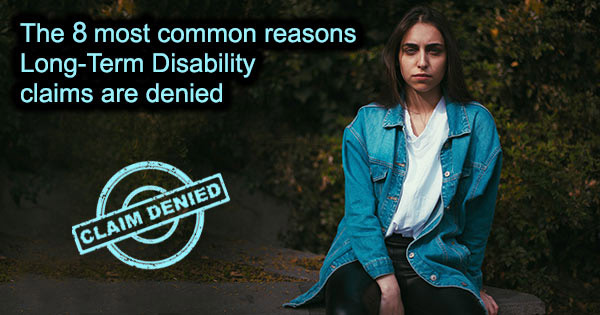The 8 most common reasons Long Term Disability claims are denied.
If you are injured or develop a serious medical condition that prevents you from working, long-term disability insurance can provide needed financial assistance; however, there is no guarantee that your claim will be approved. Long-term disability insurance is provided by employers in group plans or purchased individually from an insurance company and it is a common tactic for an insurance company to delay benefits in an attempt to hold on to the money from premiums. Because claims can be denied for a variety of reasons, it is helpful to understand why a claim may be denied when you are submitting your claim. Listed below are some of the most common reasons why an insurance company might deny your long-term disability claim. If you are suffering from the effects of disabling ailment you may qualify for disability benefits.

Long term disability claims evaluated by insurance companies can be denied for any number of reasons, even in cases where a disability is clearly evident. An ERISA LTD attorney explains.
- The medical condition/injury doesn’t meet the insurance policy definition of “disability.”
- Insufficient medical evidence and documentation.
- Missing doctor’s statement.
- The condition is not covered by the policy.
- Independent medical examiner disputes disability.
- Missed deadlines.
- Insurer uncovers inconsistencies in your claim during video surveillance.
- Insurance provider error.
Each long-term disability insurance policy contains its own guidelines and terms and states a specific definition of “disability” which the policy holder is required to meet. For example, under an “own occupation,” definition of disability, a person is disabled if they are unable to perform the duties of their own particular job. Under an “any occupation” definition, an individual is disabled if they cannot perform the duties of any job. It is important to note that some LTD policies will transition to “any occupation” from “own occupation” after two years or a certain length of time.
Any claim for disability must be supported by written proof of the disability. Sometimes an insurer does not obtain all your medical records. Make sure the insurance company requested all of the documentation supporting your claim and that those records were received. This includes medical records, chart notes, prescription records, and results from tests such as x-rays, MRIs, and lab tests. Also, you will be expected to show you are receiving regular medical attention from a doctor or therapist; if you have a mental disorder, you must have proof that you are seeing a psychologist or psychiatrist. Without this supporting evidence, an insurance company may deny your claim.
If you have been denied disability don’t give up! Contact a Disability lawyer at 512-454-4000 for a free consultation and get the benefits you deserve.
The most important piece of evidence to prove disability is a doctor’s detailed report of your condition, describing your limitations and how they impact your ability to work. Do not rely on the insurance company’s forms for this purpose; instead, ask your doctor to write a letter and submit their statement. If your doctor refuses, you should find another doctor.
Private and ERISA long-term disability plans do not cover all medical conditions and will deny coverage for conditions such as drug or alcohol abuse, self-inflicted injury, or a crime related injury. Typically, pre-existing conditions are also excluded. A pre-existing condition is one for which you received medical advice, treatment or had symptoms within a certain period of time before you applied for the policy. For example, under one insurance company’s policy, you would not be covered if you stopped work due to a medical condition within one year of the policy taking effect, or received medical treatment for the same condition you are claiming in the three-month period before the policy took effect. An insurer may also choose to limit or deny coverage for a condition based on subjective complaints, such as depression, fibromyalgia, and chronic fatigue syndrome.
The insurance provider may require you to undergo an independent medical exam (IME) if it has doubts that your condition is disabling. The insurer will choose a doctor who has been favorable to them in the past to conduct the exam. This doctor may not have the training or medical specialization to properly evaluate your condition and may not receive your complete medical records. As a result, the independent medical examiner will often conclude that your condition is not disabling, which is precisely what the insurer expects.
Filing a claim and providing requested documents on time is important at every step of the claim process. If you receive a denial, make note of all filing deadlines and the appeal deadline. You have 180 days to appeal an initial denial; if you miss that deadline, you will lose your chance to sue an insurer in federal court. All medical records and documentation should be submitted as soon as possible. Federal courts are only permitted to consider evidence in the administrative record. The administrative record is anything an insurer or administrator looks at when deciding whether or not to pay a claim. This includes medical records, reports, bills, and claim-related correspondence, as well as “peer review” reports, independent medical exams, and transferrable skills analyses provided by the insurer. Once a lawsuit is filed, the court’s review is confined to the administrative record and the court is rarely permitted to consider evidence outside the record.
In addition to an IME, an insurer may conduct an investigation with the intent of recording you in activities that conflict with your claim. They may follow you, watch your home, or talk to your neighbors, hoping to prove you are not disabled. In most cases, a person who is disabled has “good” days and “bad” days and a surveillance video may catch you on a “good” day, damaging your claim.

Long-term insurance claims representatives have different levels of experience and sometimes make mistakes. Claims administrators work for the insurance company and may deny a claim before having all the evidence. If a claim is denied, you should request a comprehensive explanation.
Filing a claim for long-term disability benefits under either a private policy or an employer sponsored plan can be confusing and frustrating.
Long-term disability insurance plans sponsored by employers are governed by the Employee Retirement Income Security Act (ERISA) and must comply with ERISA guidelines and the state’s Unfair Claim Settlement Practices Act. ERISA was enacted to protect private pension and health plans from mismanagement and fraud, but because the Act’s regulations preempt similar state or local laws, they may deprive individuals of protections provided by “bad faith” laws. Bad faith laws are laws that are created to protect consumers from unethical practices by insurance companies. An example of a bad faith insurance claim would be the refusal by an insurance agency to pay a claim in compliance with the insurance policy and delaying the processing of a claim. ERISA and state “bad faith” laws are highly complex. If your long-term disability benefits have been denied, do not hesitate to seek legal advice. Bemis, Roach and Reed has successfully handled cases against: The U.S. Government, Aetna, Cigna, Unum, Hartford, Metlife, Prudential, Standard, Connecticut General Life, Life Insurance Co. of N.A., Lincoln Financial, Northwestern Mutual, Reliance, Assurant, CNA, Fortis, Liberty Mutual, Paul Revere, and many others.
How do I avoid making mistakes in my LTD claim?
Author: Attorney Lonnie Roach
According to the Council for Disability Awareness, one out of 4 people currently in their 20s will be disabled before they retire. Most people think “It will never happen to me,” but the possibility of sustaining an injury or contracting an illness that prevents you from working always exists.

Don’t make these mistakes in your LTD claim. A successful Texas disability lawyer explains easy ways to avoid common pitfalls for claimants. Call 512-454-4000 for help with your LTD or SSDI disability claim today.
The average period of absence from work when a person becomes disabled is 34.6 months or almost three years. Some people can rely on savings to pay for expenses for a few months, but few can afford to live for years without income. Disability insurance can provide much needed income during this time, but consumers should be aware of the benefits and restrictions of any policy they purchase.
Short term disability insurance (STD) pays a percentage of your salary if you become temporarily disabled.
Examples of conditions that short term disability insurance covers are pregnancy, back injuries, and digestive disorders. Benefits last between three and six months and have a “cap,” a maximum benefit per month, as well as a limit on the time you can receive benefits.
If you have been denied disability don’t give up! Contact a Disability lawyer at 512-454-4000 for a free consultation and get the benefits you deserve.
Long term disability insurance (LTD) typically pays between 50-60% of your salary and benefits continue until you return to work, or for the number of years stated in the policy.
Some insurance policies will cover an employee until they are 65. If the applicant has a short term plan, LTD will take effect when STD benefits run out; otherwise, there is a 3-6 month waiting period before benefits begin. Both STD and LTD policies are usually part of an employee benefit plan, but can be purchased by an individual. If the policy is paid for with pre-tax dollars, as in an employer based group plan, benefits will be subject to income tax. If the plan is purchased by an individual with after tax dollars, benefits will not be taxed.
While an LTD policy purchased by an individual is governed by state law, employer sponsored LTD plans are usually governed by ERISA (Employee Retirement Income Security Act), a federal law that was enacted to protect employee rights to benefits.
ERISA disputes can be drawn out as ERISA requires a claimant to exhaust all their administrative remedies before filing a federal lawsuit. ERISA claims are very different from typical insurance claim. These claims are governed by federal law, and disputes are litigated in federal court. Policy holders who have ERISA claims would be well-advised to hire an experienced, ERISA attorney, should they be denied.
Policy holders whose claim has been denied have 180 days to appeal.
In ERISA claims, the appeal process is crucial. It may be the only opportunity to ensure the record contains the evidence necessary to win the case in court. In most instances, the court record cannot be supplemented after the appeal process ends. After the appeal is filed, the insurer then has up to 90 days to consider the appeal. If an appeal is denied, the claimant’s only remaining option to pursue benefits is to file suit.

Successful Texas attorney Lonnie Roach.
Highly experienced in ERISA LTD claims.
If you are approved for LTD benefits, the insurer will require you to file for Social Security Disability Income as well and offset any amount received from Social Security against the LTD payment.
Regardless of whether an LTD is under an employer sponsored plan or purchased individually, there are several things to watch out for in any disability claim.
Know the insurer’s precise definition of “disabled” or “partially disabled.”
Typically, “totally disabled” means unable to perform duties of your occupation due to illness or injury; “partially disabled” may provide benefits if you can no longer work at an occupation, but can work full or part-time at another job.
Understand the policy’s requirements and limitations.
Most employer-sponsored plans require the claimant to be working full-time at the onset of illness or injury. Full time usually means 30-35 hours per week; check the policy for its definition of “full time.” There may be exclusions for pre-existing diseases (illness or injury diagnosed and/or treated within a period before the policy benefits begin). Some LTD policies exclude particular accidents or diseases and many include a 24-month limitation on disabilities caused in part by drug abuse, alcoholism, mental or nervous conditions.

Know the time limits that apply for eligibility in the policy.
Most insurers have time limits on the waiting period, notice of claim, providing proof of loss, exhausting administrative remedies and filing suit. If possible, file the claim while you are still working. If you quit, the employer or insurer may claim you are no longer covered by the plan.
Work closely with your treating physicians and keep accurate records.
It is imperative to provide strong evidence for proof of disability. Get regular treatment from medical provider(s) experienced in your condition or illness and continue treatments while receiving benefits. Make sure medical providers are charting all symptoms and restrictions, including those not totally disabling by themselves. Each impairment has an impact on your disability, even those that existed before the disabling condition.
Be prepared to provide documentation to insurers throughout the claim process.
All phone conversations and other communications with the insurer should be documented in writing. Any documents and correspondence sent by mail should be sent certified mail, return receipt requested.
Prepare to be Googled
The ease of conducting a low level investigation over the internet has led long term disability companies to regularly resort to Google searches to check on their disability insurance insureds.
Most people don’t worry too much about it as they are legitimately disabled and feel that any investigation will only serve to verify their condition. Of course, this also depends on the accuracy of the things being posted about them and whether they are in the proper context. This also lies on the insurance companies’ honesty, how and if they evaluate an information rather than use it to their advantage.
Unfortunately, one cannot simply trust the internet when it comes to judging the integrity of an insurance company or the accuracy of any statement found posted.
Therefore, those with ongoing disability claims should regularly Google themselves and see what they find. They should also constantly monitor social media posts, including photographs, to make sure that none contain any inaccurate or misleading information that may reflect on their disability or even ability to work.
Many disabled insureds find themselves being questioned by their insurance carriers about small businesses where they seem to hold some type of ownership.
For example, a DBA (Doing Business As) certificate identifying an insured is likely to be discovered, leading to an investigation on his involvement in a business and his apparent ability to work after all. Some insurance companies even review Church websites to see if an insured with long term disability is involved in certain activities. Most people who are disabled continue to lead productive lives and want to discover what they can do despite their disabilities. Unfortunately, there are insurance companies that try to use this desire to their advantage, their reasoning being that if one has the ability to work, he has no right to collect disability benefits.
When it comes to seeking additional income, most disability plans not only allow for such a limited return to the workforce, they encourage it.
However, any attempt to make such a foray into the workforce on the sly in this Internet age will most likely lead to a conflict between you and your insurance carrier.
ERISA was enacted to protect private pension and health plans from fraud and mismanagement, but because the Act’s regulations preempt similar state or local laws, they may deprive individuals of protections provided by “bad faith” laws.
ERISA and state “bad faith” laws are highly complex. If your long-term disability benefits have been denied, do not hesitate to seek legal advice. Bemis, Roach and Reed has successfully handled cases against: The U.S. Government, Aetna, Cigna, Unum, Hartford, Metlife, Prudential, Standard, Connecticut General Life, Life Insurance Co. of N.A. , Lincoln Financial, Northwestern Mutual, Reliance, Assurant, CNA, Fortis, Liberty Mutual, Paul Revere, and many others.
Disability benefits are an important source of income for those who are unable to work. If you not able to work due to accident or illness, you may be eligible for Social Security Disability or Long Term Disability benefits. If you have applied for benefits and been denied, contact the attorneys at Bemis, Roach and Reed for a free consultation. Call 512-454-4000 and get help NOW.
Ruining your appeal – Top mistakes made on Long Term Disability Claims
ERISA Long Term Disability Claim and Appeal Process
Long-Term Disability Lawyer

Your Free Initial Consultation
At Bemis, Roach and Reed, if we can't help you, we will try to find the right attorneys for you.
We offer each of our prospective clients a free no obligation one hour phone or office consultation to see if we can help you and if you are comfortable with us. We know how difficult a time like this can be and how hard the decisions are. If we can be of assistance to you and help you find a solution to your issue we will even if that means referring you to another attorney.
Or simply call
512-454-4000
to schedule your
Free Consultation
Let's get you Started:
If you could provide us with some basic information about your claim we will get right back with you with a free case evaluation and schedule your Free Consultation Today.








